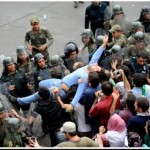Monday
Jun152009
Israel-Palestine: Netanyahu's Two-State Magical Sidestep
 Monday, June 15, 2009 at 9:41
Monday, June 15, 2009 at 9:41
NEW Video: Netanyahu on US Television (NBC “Today” Programme – 15 June)
Transcript: Netanyahu Speech on Israel-Palestine (14 June)
 Israeli Prime Minister Benjamin Netanyahu is a master politician, but as he walked to the podium at Bar Ilan University yesterday, he faced a magician's challenge: how could he ever wish away the headline US pressure on his Cabinet to start a meaningful Israel-Palestine peace process by halting the expansion of Jewish settlements in East Jerusalem and the West Bank?
Israeli Prime Minister Benjamin Netanyahu is a master politician, but as he walked to the podium at Bar Ilan University yesterday, he faced a magician's challenge: how could he ever wish away the headline US pressure on his Cabinet to start a meaningful Israel-Palestine peace process by halting the expansion of Jewish settlements in East Jerusalem and the West Bank?
No problem for Bibi: he did it with a wave of the hand: "The territory under Palestinian control must be demilitarized with ironclad security provisions for Israel." With that single sentence, the Prime Minister not only escaped from Washington's chains; he draped them around the shoulders of the Palestinian Authority.
The international media, primed in advance by the Prime Minister's office, rushed to declare that Benjamin Netanyahu, for the first time, had recognised a Palestinian state. Netanyahu's three references to that "state", however, were either far from positive or laden with conditions: "There is a real danger that an armed Palestinian state would emerge that would become another terrorist base against the Jewish state"; "It is impossible to expect us to agree in advance to the principle of a Palestinian state without assurances that this state will be demilitarized"; and, most importantly:
This was a political manoeuvre (I'll shy away from a reference to a magician's trick) of the highest order. Netanyahu ensured that he got the immediate endorsement of the White House without giving any ground.
For the immediate effect is to turn pressure onto the Palestinian Authority. Under Netanyahu's formula, Mahmoud Abbas and his advisors will have to not only repeat their recognition of Israel, given to the US-UN-European Union-Russia Quartet, but also declare in advance that they will not have any armed forces beyond local police. They will have to renounce the Palestinian "right to return" to lands owned in Israel before 1948.
While putting conditions on his Palestinian counterparts, Netanyahu is trying to make the condition set on Israel by US disappear. He began with the apparent concession, "We have no intention of building new settlements or of expropriating additional land for existing settlements," while at the same time trying to lock in construction which has already occurred or been authorised by the Israeli Government:
Far from incidentally, the Israeli Prime Minister also drew the line against any political recognition of Hamas, a possibility opened up in President Obama's Cairo speech. He did so far from subtly: "Above all else, the Palestinians must decide between the path of peace and the path of Hamas." Even more importantly for his strategy, Netanyahu used the Hamas menace to reinforce his demands on the Palestinian Authority: "Without [demilitarization], sooner or later, these territories will become another Hamastan."
Of course, Netanyahu's success may only be short-term. This morning, the initial headlines have of his "two-state" declaration have been offset by stories of the Palestinian rejection of his speech. And there are signs that Obama officials may have recognised their endorsement was given too quickly, in light of Netanyahu's conditions and his rejection of their condition to resolve the settlements issue.
For the moment, however, the Israeli Prime Minister has given himself a bit of breathing space. The US had hoped to follow the Cairo speech with diplomatic advances through envoy George Mitchell's talks in Tel Aviv, Ramallah, and Damascus. Netanyahu's manoeuvres, with his staff publicly denouncing Washington's approach before the promise of a speech after Mitchell's departure, and (height of ironies) the sudden attention given to Mahmoud Ahmadinejad's "victory" in Iran has blocked those American hopes.
Netanyahu's magic? At the same time that he supposedly accepted the "two-state" peace process, his carefully-framed speech --- for the moment --- made it disappear.
Transcript: Netanyahu Speech on Israel-Palestine (14 June)
 Israeli Prime Minister Benjamin Netanyahu is a master politician, but as he walked to the podium at Bar Ilan University yesterday, he faced a magician's challenge: how could he ever wish away the headline US pressure on his Cabinet to start a meaningful Israel-Palestine peace process by halting the expansion of Jewish settlements in East Jerusalem and the West Bank?
Israeli Prime Minister Benjamin Netanyahu is a master politician, but as he walked to the podium at Bar Ilan University yesterday, he faced a magician's challenge: how could he ever wish away the headline US pressure on his Cabinet to start a meaningful Israel-Palestine peace process by halting the expansion of Jewish settlements in East Jerusalem and the West Bank?No problem for Bibi: he did it with a wave of the hand: "The territory under Palestinian control must be demilitarized with ironclad security provisions for Israel." With that single sentence, the Prime Minister not only escaped from Washington's chains; he draped them around the shoulders of the Palestinian Authority.
The international media, primed in advance by the Prime Minister's office, rushed to declare that Benjamin Netanyahu, for the first time, had recognised a Palestinian state. Netanyahu's three references to that "state", however, were either far from positive or laden with conditions: "There is a real danger that an armed Palestinian state would emerge that would become another terrorist base against the Jewish state"; "It is impossible to expect us to agree in advance to the principle of a Palestinian state without assurances that this state will be demilitarized"; and, most importantly:
If we receive this guarantee regarding demilitarization and Israel’s security needs, and if the Palestinians recognize Israel as the State of the Jewish people, then we will be ready in a future peace agreement to reach a solution where a demilitarized Palestinian state exists alongside the Jewish state.
This was a political manoeuvre (I'll shy away from a reference to a magician's trick) of the highest order. Netanyahu ensured that he got the immediate endorsement of the White House without giving any ground.
For the immediate effect is to turn pressure onto the Palestinian Authority. Under Netanyahu's formula, Mahmoud Abbas and his advisors will have to not only repeat their recognition of Israel, given to the US-UN-European Union-Russia Quartet, but also declare in advance that they will not have any armed forces beyond local police. They will have to renounce the Palestinian "right to return" to lands owned in Israel before 1948.
While putting conditions on his Palestinian counterparts, Netanyahu is trying to make the condition set on Israel by US disappear. He began with the apparent concession, "We have no intention of building new settlements or of expropriating additional land for existing settlements," while at the same time trying to lock in construction which has already occurred or been authorised by the Israeli Government:
There is a need to enable the residents to live normal lives, to allow mothers and fathers to raise their children like families elsewhere. The settlers are neither the enemies of the people nor the enemies of peace. Rather, they are an integral part of our people, a principled, pioneering and Zionist public.
Far from incidentally, the Israeli Prime Minister also drew the line against any political recognition of Hamas, a possibility opened up in President Obama's Cairo speech. He did so far from subtly: "Above all else, the Palestinians must decide between the path of peace and the path of Hamas." Even more importantly for his strategy, Netanyahu used the Hamas menace to reinforce his demands on the Palestinian Authority: "Without [demilitarization], sooner or later, these territories will become another Hamastan."
Of course, Netanyahu's success may only be short-term. This morning, the initial headlines have of his "two-state" declaration have been offset by stories of the Palestinian rejection of his speech. And there are signs that Obama officials may have recognised their endorsement was given too quickly, in light of Netanyahu's conditions and his rejection of their condition to resolve the settlements issue.
For the moment, however, the Israeli Prime Minister has given himself a bit of breathing space. The US had hoped to follow the Cairo speech with diplomatic advances through envoy George Mitchell's talks in Tel Aviv, Ramallah, and Damascus. Netanyahu's manoeuvres, with his staff publicly denouncing Washington's approach before the promise of a speech after Mitchell's departure, and (height of ironies) the sudden attention given to Mahmoud Ahmadinejad's "victory" in Iran has blocked those American hopes.
Netanyahu's magic? At the same time that he supposedly accepted the "two-state" peace process, his carefully-framed speech --- for the moment --- made it disappear.


 Protesters have blocked one of the major expressways in/out of Tehran, bringing traffic to a standstill.
Protesters have blocked one of the major expressways in/out of Tehran, bringing traffic to a standstill. We have finally tracked down a copy of Israeli Prime Minister Benjamin Netanyahu's major foreign policy speech at the Begin-Sadat Center today. We'll have a full analysis tomorrow, but our immediate impression is of Netanyahu trying to take the pressure off his Government by putting the ball in the court of the Palestinians and, beyond them, the US. He is trying to hold to his preferred agenda of discussing economic development and security measures rather than statehood but also having to bend a bit to the American insistence on a two-state resolution.
We have finally tracked down a copy of Israeli Prime Minister Benjamin Netanyahu's major foreign policy speech at the Begin-Sadat Center today. We'll have a full analysis tomorrow, but our immediate impression is of Netanyahu trying to take the pressure off his Government by putting the ball in the court of the Palestinians and, beyond them, the US. He is trying to hold to his preferred agenda of discussing economic development and security measures rather than statehood but also having to bend a bit to the American insistence on a two-state resolution.